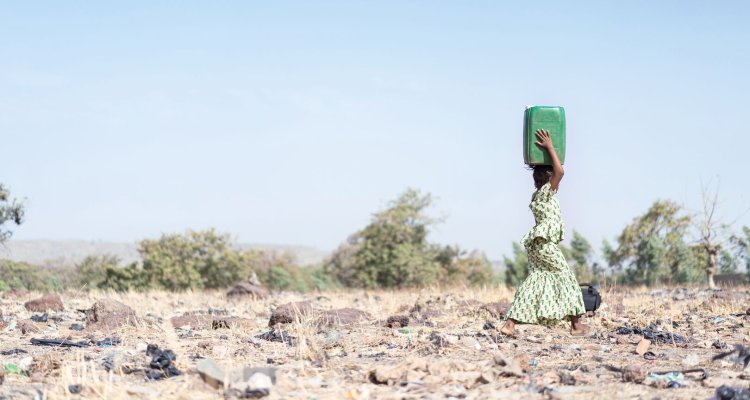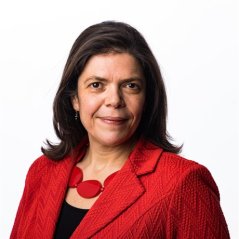
Looking back
'The water crisis requires courage and cooperation'
The world will have to deal with water problems far more often in the future. Water experts from all corners of Wageningen University & Research recently met with decision-makers and partners from government and the private sector and called for cooperation and decisiveness.
Flooding, water scarcity, pollution and salinisation of water are increasing threats to us. These issues endanger nature and biodiversity, food production and human and animal health. Climate change exacerbates these problems. Water management will surely play a more important role in the future. But how exactly all these things come together is a complicated puzzle.
On 17 September 2024, many pieces of that puzzle came together during the symposium Water@WUR: Science for Impact in the Reehorst in Ede. This event brought together Wageningen agricultural scientists, ecologists, public administration experts, water technologists, sociologists, hydrologists and many others with representatives of governments, companies, water boards, drinking water companies and consultants who deal with water issues in practice on a daily basis.
The symposium was organised by Water@WUR, a network of water researchers within Wageningen University & Research. It built on the water vision they developed earlier.
Courage
‘The problems require firm decisions from administrators in government and business. That requires courage and leadership’, concluded Petra Hellegers, Professor of Water Resources Management, at the end of the day. In the Netherlands, for example, the poor quality of surface water requires action. ‘But internationally, too, the importance of water should be much more central in decisions about trade or food security,’ Hellegers said.
What is Water@WUR?
Water@WUR is an initiative of researchers at WUR in the field of water in all its facets. The aim is to bundle all expertise in the field of water within the organisation and to put it in the spotlight. In addition, it wants to connect with external parties around water, and promote partnerships.
The conclusion of the day was that for sufficient and clean water to gain greater importance, researchers, policymakers and the business community need to work together much more. Sharing more knowledge and scarce labour resources can help to put the theme more firmly on the agenda.
How diverse the theme is, and how all these different insights come together in Wageningen, was evident from the six lectures given by scientists. The lectures were linked to the six strategic themes of WUR. The scientists presented major problems, but also provided solutions.
Too salty
For example, Ayodeji Deolu-Ajayi, researcher at Wageningen Plant Research, explained that salinisation of agricultural land due to salt water causes a significant yield loss worldwide that could have fed 170 million people. The salinisation is the result of rising sea levels and more intensive land use. There are various solutions and adaptations, such as growing salt-tolerant crops, building dams or creating nature areas. Which solution works is a puzzle that needs to be put together with stakeholders, residents and farmers, Deolu-Ajayi said.
Too dirty
Water pollution is also a major problem. In the Netherlands, for example, the loss of biodiversity in freshwater is enormous, according to ecologist Ralf Verdonschot of Wageningen Environmental Research. Among other things, this is caused by pollution due to pesticides and nutrients from agriculture. But there are solutions as well, such as restoring the natural course of waterways and restoring habitats of species. We also need to exert pressure on politicians for stricter legislation and enforcement of rules against pollution.
MSc Award
At the end of the day, the presentation of Folkert Hellinga MSc Award of the Land and Water Network took place. Find out more about the winner:
Unhealthy
Some time later, Adriaan Antonis, researcher at Wageningen Bioveterinary Research, warned of potential health risks as a result of water management measures. More wet nature and a higher groundwater level are good for nature and make us more resilient to drought. But more wet nature can increase the risk of bird flu, or mosquitoes that cause infections in humans. The connection between water and human and animal health requires dialogue among scientists from all corners of WUR, Antonis concluded.
Big and small
The big picture came from Professor Hester Biemans, who talked about how the melting of the third pole, the Himalayan glaciers, threatens irrigation water for the production of a third of the world's rice production. Environmental technologist Nora Sutton, on the other hand, is researching how minuscule microbes can be used in water purification in smart combinations with other techniques. Wastewater, Sutton said, is a major source of valuable substances for the circular economy. A third of our phosphate demand could be extracted from wastewater. To do this, we need to recover many more valuable substances from wastewater.
Drought
Drought is an increasing problem worldwide. But it is often misunderstood, said socio-hydrologist Pieter van Oel. For example, pipelines are built to bring water to places where it is scarce, such as in the north of Brazil. But that leads to depleted water reservoirs. Paying more attention to the diagnosis and symptoms of the problem can help, he explained. A better solution might be to make people less vulnerable to drought.
In the afternoon, there were eight parallel discussions in which meetings took place between research and practice. People from the field were given the stage to talk about their water challenges and their experiences with collaboration, which were discussed by the attendees. A number of them are featured in the pages below.
Find out more about water challenges in the field
Simkje Kruiderink of LVVN: 'Wageningen works across the entire nexus'

Simkje Kruiderink is cluster coordinator Biodiversity and Water within the International team of the Dutch Ministry of Agriculture, Fisheries, Food Security and Nature (LVVN), which manages the LVVN-councils at embassies worldwide. She explains what brings her and her colleagues to the Water@WUR symposium.
‘We come here to be inspired. It is important for us to know what knowledge the Netherlands is developing. WUR is part of the Dutch Diamond, the combination of the Dutch government, knowledge institutions, companies and NGOs that can make a difference internationally. WUR develops knowledge and concepts that are relevant to our work, for example for projects at embassies, but also in multilateral negotiations, or at the European level.’
Well-known
‘Of course, we also go to other knowledge institutions. But WUR is the knowledge institution we go to in the first place, because Wageningen works across the entire nexus. Water, biodiversity, climate change and food production come together. And WUR is well-known, even internationally. That brand awareness abroad helps us as well, since partnerships easily arise.’
Out of the silo
‘Wageningen is strong in systems thinking. If you are looking for a solution to a water problem, you want to avoid waterbed effects, where a solution here causes a problem elsewhere. To do this, it is very important that you get out of your silo mentality and into a systems mentality, and WUR is an expert in that. We often apply this in area-based approaches. And we consider which companies we can involve, and what knowledge they offer. Wageningen is good at this kind of system analysis at the area level.’
Water matters
‘Water is a hugely important subject for the minister. The entire manure problem has a large water component to it. And the policy principle that water and soil are guiding in spatial policy is also very political. These are principles on which our agricultural, climate adaptation and nature policy is built. Taking water and soil systems into account will continue to be of importance under the new government.’
Anne Swank of drinking water company PWN: ‘Take the lead in the field of water and nature’

Anne Swank is a drinking water advisor at water company PWN in North Holland. In one of the sessions during the Water@WUR event on 17 September 2024, she discussed the collaboration with Wageningen Environmental Research, which conducted research into what a water-purifying landscape could look like. What is her impression of the day?
‘It's great to see how people involved in water in different ways come together. I studied in Wageningen myself, so I met a lot of acquaintances. But it's also nice to see such diverse projects being carried out at WUR. On very different aspects that all have to do with water and that are connected to each other. I am impressed by the quality of the research I see.’
Purification
‘The fact that Wageningen in particular has so much knowledge on water issues should be better known. People may think of Delft when it comes to hard water knowledge, but for us and for many others, we are more interested in knowledge about water in connection with nature, with food production and recreation. Our question as a drinking water company was what a natural purifying landscape for drinking water production could look like. Together with Wageningen Environmental Research, we had some excellent design sessions, during which we learned a lot from each other. They were able to solve our water purification issue very well with a Nature-Based Solution.’
In the spotlight
‘WUR's knowledge is incredibly powerful. And it is desperately needed, now that we are increasingly faced with issues such as climate change, water management and water quality. Companies can make good use of that knowledge. Wageningen should put itself in the spotlight a bit more with that knowledge and that systems approach. I would say, take the lead when it comes to water and nature.’
Piet Dircke of Arcadis: ‘Wageningen needs to make itself heard’
Piet Dircke is Global Advisor Climate Adaptation at engineering company Arcadis. He studied tropical agricultural engineering in Wageningen in the 1980s. What is his impression of the symposium Water@WUR on 17 September 2024?

‘It is impressive to see the accumulated knowledge in the field of water, the energy and the drive of the people here. Wageningen has become ever more important in a world in which we have to deal with climate change, food problems, energy problems, population growth and migration flows. Wageningen has a great story to tell. At the same time, the big challenge – I'm a Wageningen engineer myself – is how we manage to really put this in the spotlight.’
Outward
‘In part, this can be done by making ourselves heard more. We need to speak out louder. But we also need researchers at Wageningen University & Research to better understand how the outside world works. The power play of business, governments, multinationals and large institutions at the European and global level is an arena where Wageningen researchers do not always feel at ease. My suggestion is to go outside more often. Get out of the small, sheltered city of Wageningen, which, by the way, is a very international community, and enter into dialogue with the government and the private sector.’
Battle for talent
‘One way in which Wageningen University is already doing this, is training the employees of the future. The private sector wants to become more sustainable, but is also forced to focus more and more on efficiency, doing business quickly, and getting a lot of returns. That is difficult to change from the outside. But it can be done from within. WUR educates critical students who will later work for companies, or become clients of companies. There is a battle for talent going on, there is scarcity on the labour market. Our young employees at Arcadis don't necessarily want to make a profit, they want to provide meaning, have a meaningful job and make a positive impact. Today's companies that strive for sustainability are rewarded for this by bringing in the best employees. If you want to attract good people as a company, you have to offer meaningful work.’
Water board chair Marijn Ornstein: ‘Water interests must be safeguarded more effectively’
The Netherlands is facing major challenges in the field of spatial planning. The importance of water therefore needs to weigh more heavily, says chair of the water board Marijn Ornstein. ‘Let science and practitioners work together to make the urgency of water problems more visible.’

Chair of the water board Vallei en Veluwe, Marijn Ornstein, spoke during one of the afternoon sessions of the Water@WUR symposium on 17 September 2024. ‘We don't have enough space in the Netherlands for all the functions we want, such as housing, nature, agriculture and energy transition. This requires difficult decisions that require administrative courage. We can't build everywhere, especially in low-lying places where we will have to deal with flooding in the future. Nor can we continue to raise our dykes indefinitely. And drinking water is not an infinite resource.’
Lack of courage
But Ornstein misses that administrative courage at the moment. ‘Decisions are postponed. The National Programme for Rural Areas (NPLG), which advocated a good integrated approach, has been abolished. The government must quickly come up with an alternative to this. And the policy of the previous government, making soil and water guiding in the spatial planning of our country, must remain intact. That should go without saying. If it isn't, then apparently the importance of water is not sufficiently clear.’
Influence
This requires that the role and influence of the water boards and the water management goals are better safeguarded in spatial planning, says Ornstein. ‘The new Environment and Planning Act (Omgevingswet) stipulates that the importance of water must be taken into account in the spatial planning process. But this weighting is now too non-committal. Not only in terms of how and when it should take place, but also in terms of the impact of this weighting.’
Together
Ornstein also sees a role for science, such as Wageningen University & Research. ‘Research can reveal the urgency of water problems. In particular, more research is needed into the quality of water. What does improving the quality of our water require from the spatial planning in our country?’
In doing so, Ornstein called for cooperation. ‘We work in a tight labour market. We can start new partnerships in which we share knowledge and manpower, instead of competing over them. Let's continue to seek each other out and inspire each other. Especially in times when our society is facing such major challenges and transformations.’
